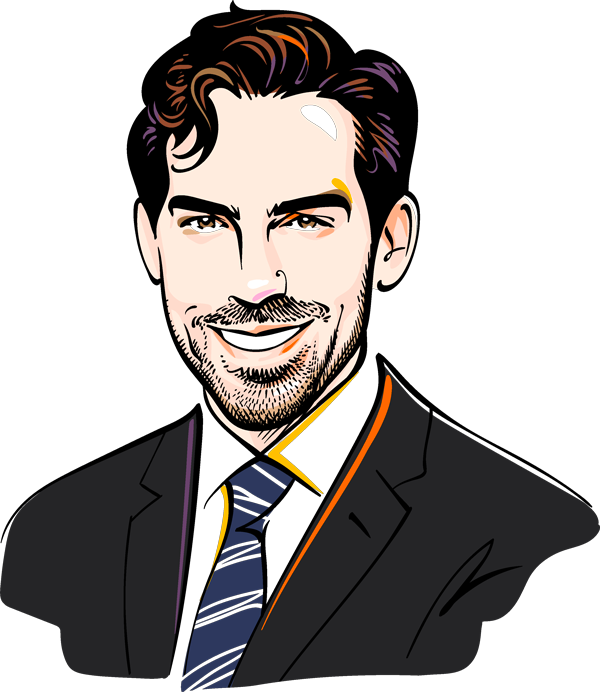Profiles in
Action

Michelle Chan ’15
good leader meets people where they are. That’s something I have learned through my involvement in the Fordham Law Alumni Association’s Recent Graduates Committee and our Alumni Attorneys of Color affinity group. It’s made me very aware that, because people have so many other things going on in their lives, it can be a challenge to meet our members where they are and where they need us. We really try to think about what might appeal to them so we can address what they want when we’re planning events and outreach.
There can be a big learning curve for junior associates, and that can be really stressful. Some struggle to find ways in which they can be useful when they’re still learning, which I know is really hard. But I’ve tried to let them know that, no matter how junior you are, you can still take initiative—you don’t have to wait to be asked to do stuff. Be proactive. Ask, “What can I get started on?” “What can I take ownership of?”
The way you deliver feedback matters. Even if you’re not getting the deliverables you want—which can be frustrating when you feel you gave good instructions—it’s so important to remember what it was like to still be learning and to feel so overwhelmed but want to succeed. I try hard to remember what it was like to be in someone else’s shoes.

Veronica Dunlap,
gabelli ’14, law ’14
hile I was a law student, I was so concerned about not being the perfect law firm candidate because I was a single mom and an older student. At Fordham Law, I had two amazing mentors who made me challenge myself—former assistant dean of student affairs and diversity initiatives Nitza Escalera and former associate director of student affairs and director of academic enrichment Carmen Morales ’90. Both are women of color who I looked up to as such powerhouses. They were great at helping students find balance and in helping you to find tutors if you needed that. But they also had families and plenty of outside interests. I saw I could create a life as a lawyer and as a mom.
In my third year of law school, I had an externship with the National Action Network. The general counsel there, Michael Hardy, really threw me into the fire and had me doing so much. He told me, “Law school is not going to teach you how to be a lawyer; you have to test those things out.” It was a fantastic experience.
Hardy taught me what I think is the number one skill in being a good leader and being a good lawyer: listening. He said, “Eighty percent of lawyering is listening”—not listening to your own thoughts, but putting down your guard and processing what others are saying and asking clarifying questions.
Another critical leadership skill is being aware of your own limitations—having the humility to say, “I don’t know the answer.” It can take a lot of courage to say you don’t know something. And that comes with experience.
Being a leader means helping other people succeed, grow, and develop, which is ultimately also good for you and any of the work you’re going to do. I’m not going to live forever—I want this work to continue! And I want it to be done by people who care as much as I do, have the same work ethic I have, and have had enough experience and not been held on the sidelines. So I’m not so arrogant that I can’t step aside and pass around assignments.
I like to involve people in decision-making. Instead of making a unilateral decision, when I’m not really sure how people feel about something or how they might react, sometimes I will survey the people who work with me. That helps me have a more evidence-based decision-making process and one that is truly collaborative.
To give back and help the next generation of leaders, I have been a longtime member of the Metropolitan Black Bar Association in New York City, where I’ve mentored pre-law and law school students. Now, at the ACLU of Maryland, we’re creating an internship pipeline from the local historically Black colleges and universities so they have direct experience trying to get wins for themselves.

Will Lanier ’23
n my pre–law school professional experience running a nonprofit, I always tried to seek lots of advice and ask tons of questions from all kinds of people. I know I don’t know everything—and that’s OK! I think asking for help and asking for guidance is actually a strength.
It’s very important to meet people where they are—in terms of their skills and what they’re naturally good at. For instance, if I’m meeting with an employee about a certain issue, I try to really consider what might be their standpoint based on where they are in their career or what they know or don’t know. I have to meet them at the level where they currently are so I can help guide them to where I want them to be. It’s never one-size-fits-all, and I try to take into account lots of other things, like cultural backgrounds or even internalized trauma that could affect how people relate to one another.
Growing up, I was really into theater, and one of my drama teachers in high school was an early mentor to me. She taught me that being different, being “weird,” was actually cool. You should never hide who you really are—that is part of what makes a good leader.
I felt a real urgency to become a leader in law school as fast as I could. As a second-career law student, I don’t have the runway of a super-long legal career that some of the other students who will graduate at 25 have. The beauty of law school—and the beauty of Fordham Law, in particular—is there are so many leadership opportunities you have access to, starting in your first year. We have over 65 student groups, and each one has a 1L representative. For anyone wanting to be a leader, you just have to put yourself out there and get involved.
If you want to be a leader—if you want to be seen as someone who is going to do great things through leadership—you have to be comfortable with being uncomfortable, whether that means doing something scary or having difficult conversations.
I feel strongly about the importance of face-to-face communication, especially when something is a complicated conversation. Never do this via email. This is especially key when it comes to advocating for yourself. You can spend an hour crafting an email, or you can spend an hour crafting talking points so you can have a productive conversation. Doing this will invariably help you be a better lawyer later.

Tricia Reilly ’19
hen I was an undergrad at Lafayette College, I interned with Judge Paula Roscioli [of the Court of Common Pleas of Northampton County] in Pennsylvania, and she has been so influential in my path to law school and into my career. She’s a great communicator and very friendly, approachable, open, and transparent. She also explains why she’s doing something. She’d often take the time and the extra step to explain the reasoning behind something she did in court or to comment on what you did well. I actually found that her confidence also inspires confidence in yourself.
I learned a lot about leadership at Fordham Law in the Community Economic Development Clinic with Professor Brian Glick. The clinic gave me the space to take ownership of my own work and build up some confidence as I learned more about the practical side of the law and how to interact with clients.
This all helped me realize how important personal interactions are—that being personable, outgoing, smart, and confident are invaluable attributes.
You also have to know that people up the chain aren’t always going to reach out to you and say, “Hey, can you take this thing on?” You have to step up and make sure you have those personal interactions—especially during these times when so many things are still remote or remote-optional—so you become someone who comes to mind when a new opportunity arises.
When I am working on something tricky, my instinct is to take a first stab at coming up with a solution before I reach out for help up along the chain. That way, I can go to someone and say, “Here’s what I think a good path could be.” I think people appreciate it if you take the initiative to solve something before just immediately asking for help. I think that brings about a more thoughtful approach.

Shade Quailey ’19
rom a young age, I decided I would never let my circumstances determine whether I achieved the goals I set for myself. As a first-generation college graduate, I definitely had to seek mentors and help from a lot of sources. I would reach out to people on LinkedIn and ask them about schools and careers, networking before I really even knew what networking was. I believe in the power of working hard and always giving my best for success, even if it won’t always look the same from day to day, year to year.
All of the people I’ve considered to be good leaders share certain features. They are passionate about what they do, kind and empathetic, yet assertive. Personally, as a Black woman, I am always hyperaware of my tone, never wanting to come off as “too aggressive.” I work to keep that balance in mind, to be empathetic but not allow others to walk over me. It’s how I was raised.
When I talk to students, I tell them to approach everything with kindness and compassion. It’s so easy to find yourself under immense stress and pressure and become the worst version of yourself; we’re all human. But being a strong leader means learning to act with grace under pressure and to be kind to everyone at every level—including the people coming up the ranks behind you. How you treat the person on the lowest rung of the ladder says everything.
A good leader also wants to see others succeed. Part of that is providing feedback and being open to questions like, “What should I improve on for next time?” or, “What should I never do again?” In fact, that’s something I really appreciated about Judge Peter H. Moulton [of the New York State Supreme Court Appellate Division, First Department], who I clerked for, and it was what brought me to BakerHostetler. I’ve been very fortunate to have worked with Judge Moulton, and now with attorneys at BakerHostetler, who provide meaningful feedback, are always available for questions, and truly appreciate open communication, which has resulted in my learning so much in the past three years since I’ve graduated.
I got to know Dean Emeritus John D. Feerick ’61 during Fordham’s summer study abroad program in Ireland. He really took the time to get to know each student and gave us great advice. He cares so much about supporting the next generation of lawyers and truly wants to see young lawyers succeed. The example he set further inspired me to continue returning to Fordham Law, lifting as I climb, and giving back through sharing my story and speaking on panels and mentoring students.
I also think it’s important to have a realistic sense of optimism—not blind optimism, which can be toxic. I’ve always appreciated people who are passionate about what they do, even on their most challenging days. When people speak with passion about something, I think it just makes everyone a bit more excited and motivated for it.
I’ve learned to really focus on what I can control. In my work, on any assignment I get, I always take ownership of it completely, and that has led to additional opportunities that enable me to showcase and further develop my leadership skills and my litigation skills at this early stage of my career.

Alexander Wentworth-Ping ’13
y varsity swim coach at Williams College, Steve Kuster, really tried to kind of get to know each of us personally and, I felt, did his best to try to tap into what our strengths were. He’d have us write down the things we wanted to accomplish, both personally and as a team.
That’s something I’ve noticed about leaders ever since then: They are great communicators, are able to help people find their best way of contributing, and also ask people set goals. That is something to remember when you’re part of a group at any level—that you can always set goals and clearly communicate those to others.
As a leader, you have to keep in mind your overall organizational goals, set clear expectations, and also have strong communication skills so people feel comfortable that there are open lines of communication. You have to be able to have difficult conversations.
I have always felt more comfortable in a situation where you’re able to fail. If you have those open lines of communication with a supervisor, you can pick yourself up after a failure and move on.
When I was in Fordham Law’s Federal Litigation Clinic, led by Professor Michael W. Martin, I delivered an oral argument for a workplace discrimination case in the Eastern District of New York. We were dealing with this incredibly difficult opposing counsel who kept interrupting me while I was presenting my case to the judge. I snapped back at him and clenched my fists, feeling really angry. Afterward, Professor Martin said to me, “Definitely don’t do that again.” To this day, I won’t forget that very teachable moment, of learning how important it is to restrain yourself.
I think leadership is about accountability and being committed to success for the whole group—whether you’re the top partner at a law firm, the managing partner, or a first-year associate. Good leaders are aware that the buck stops with them—that they are ultimately accountable and aren’t going to throw other folks under the bus. If something does go wrong, I’m the one who’s responsible.
A lot of the qualities of being a great leader transcend your place on the org chart. Even when I was a first-year associate at a law firm, I tried to really understand the expectations of my partner and be clear about what other partners were asking of me. Working to establish open communication can sometimes be intimidating, but I feel people gravitate toward those who make it a priority to create that open environment.
As an assistant U.S. attorney, I’m finding I’m enjoying the challenge of figuring out how to get the best out of the people I have around me. We don’t have unlimited time or money, so we need to be efficient. I find it rewarding to see how I can help people be productive in a healthy way.